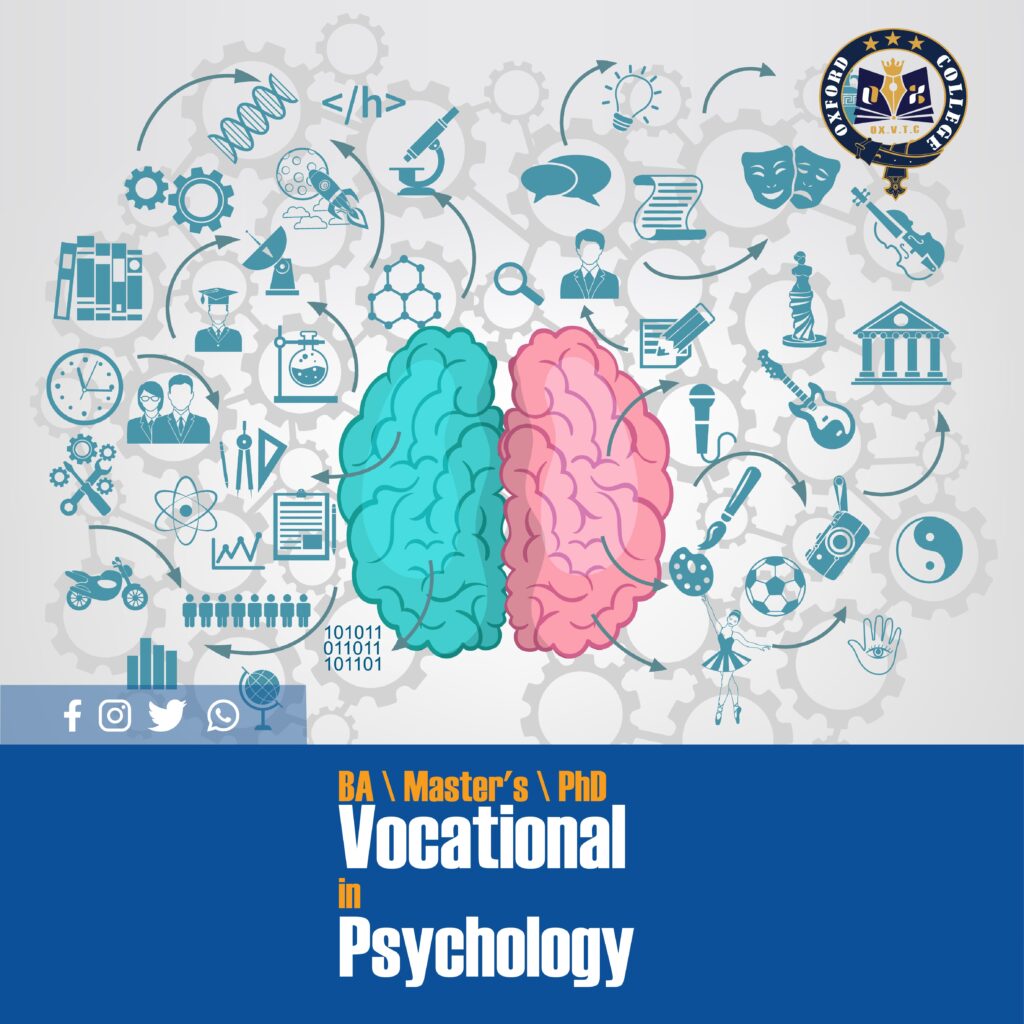Department of Psychology

اتصل بنا عبر البريد الإلكتروني على info@oxfordcollage.uk أو أرسل استفسارًا تجاريًا عبر الإنترنت.
who should attend?
This program is geared to:
– Psychologists
– Workers in the field of psychological and educational consultancy
-For psychological counsellors in schools and institutions
-For teachers and educators
-Social reformers
– Self-development trainers
– Students and graduates of psychology faculties
– Any individual who has an ambition to learn the basics of psychology to practice a profession in this discipline or to understand all individuals in his surroundings and analyze their personalities.
objective
This program aims to:
– Provide the foundations of psychology, mental health exploration, and behavior modification.
– Providing students with basic knowledge and skills in the field of psychology, guidance and social work.
– Building a strong foundation for critical and analytical thinking.
– Develop skills to build and evaluate personality, allowing for the discovery of nuances between human beings.
– Preparing students to become professional psychology instructors.
content
Program hubs:
1. Introduction to Mental Health and Psychology: Psychology is the scientific study of behaviour, and in this topic we will address the history of psychology, its origins, its branches, its importance and its objectives, and the characteristics of modern psychology. This axis will serve as a prelude to entry and more specialization in psychology. You will study with us basic concepts in mental health, determinants of human behavior, psychological compatibility, and some mental illnesses and psychotherapy. It will also be learned to analyze the mental and behavioral processes of humans and their interactions with the physical and social environment, predict their future actions, understand the psychological phenomenon through qualitative methodologies, and identify the knowledge school that is considered the best school of psychology.
2- Applied Psychology: This theme will provide you with basic concepts of statistics, psychological research design, introduction to the principles and practices of the psychological method, and the use of inference statistics. In this theme, each student’s experience will be developed to understand the rationale for statistical tests, and apply them to the results of psychological research. We will examine personal assessment, models used in personality testing, individual differences, key characteristics of tests and questionnaires, differentiation between measures of general capacity and special capacity, how tests and questionnaires are used and analysed and identified, and their suitability, and scientific interpretation of test and questionnaire results. Building and providing focused and effective behavioural interviews.
3- Cognition and Intelligence: We will study in this axis basic topics in psychology, where our sensory systems affect our experience of our bodies, and what exists in the world, in the axis of perception and intelligence will learn how these sensory systems affect our behavior in the world, and will expand concepts to be able to make decisions and solve problems, and we will learn about the historical development of the concept of intelligence, measurement and its relationship to creativity, and emotional intelligence.
4- Developmental Psychology: We will study in this unit human psychological development, and we will choose experimental issues to focus on within the field of developmental psychology, as we will learn the concept of pathological psychology, and we will study issues such as: sense of identity, social perception, thinking and ethical behavior, in the axis of developmental psychology we will study how to deal with children, recognize their thinking, the points that should be focused to build the child’s personality and develop his intelligence, and deal with adolescents, and we will learn about the genetic and environmental effects in developmental science.
5- Character patterns: In order to live with those around you and understand the reasons for their behavior and motivations you must know the patterns of the characters and how to deal with each pattern. In this theme, you will learn about the patterns and types of characters, the advantages and disadvantages of each type, how each type behaves in different situations, how to deal with each type, types of character analysis, and decision-making.
6- Body language: Even if you are not an expert in body language, or need to practice in this area, this axis will know how to employ your body movements to express yourself and in return how to understand the movements of others, and their gestures, this axis will include practical exercises to know the secret of the language of your body and the body of others, and how to employ the language of your body to enhance your thoughts and words, and you will know what hides others from you, and we will study the semantics of the movements of the arms.
Looking for higher education, at the postgraduate level (Master’s, Professional Doctorate) ?
